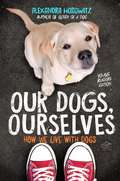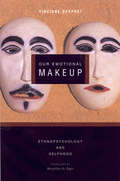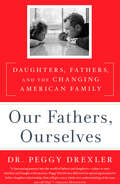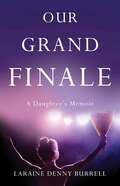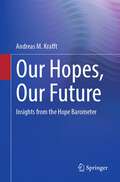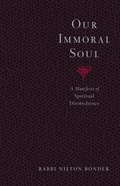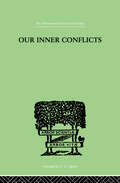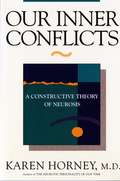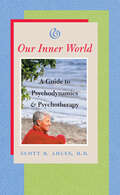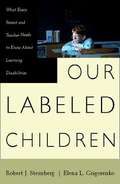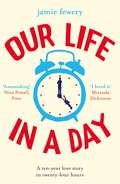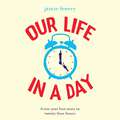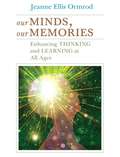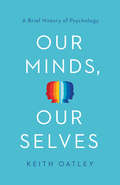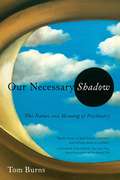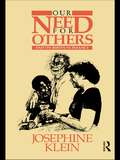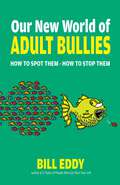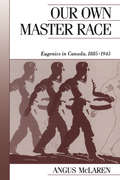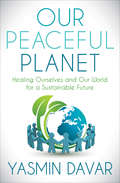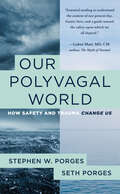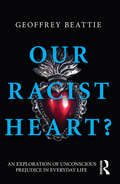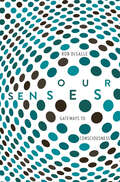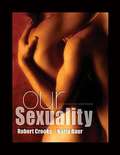- Table View
- List View
Our Dogs, Ourselves -- Young Readers Edition: How We Live with Dogs
by Alexandra HorowitzThis middle grade adaptation of Our Dogs, Ourselves is an eye-opening, entertaining, and beautifully illustrated look about humans&’ complicated and sometimes contradictory relationship with man&’s best friend by New York Times bestselling author of Inside of a Dog—Young Readers Edition.We keep dogs and are kept by them. We love dogs and (we assume) we are loved by them. Even while we see ourselves in dogs, we also treat them in surprising ways. On the one hand, we let them into our beds, we give them meaningful names, make them members of our family, and buy them the best food, toys, accessories, clothes, and more. But we also shape our dogs into something they aren&’t meant to be. Purebreeding dogs has led to many unhealthy pups. Many dogs have no homes, or live out their life in shelters. How is it possible we can treat the same species in these two totally different ways? In Our Dogs, Ourselves Young Readers Edition, bestselling author of Inside of a Dog, Alexandra Horowitz reveals the odd, surprising, and contradictory ways we live with dogs.
Our Emotional Makeup
by Vinciane DespretBroken hearts, edgy nerves, tightened throats—our emotions grab and take hold of us. But if our emotions appear obvious to us, are they necessarily real or universal? This, of course, is what researchers in physiology and psychology assert, but they will ultimately be disappointed. Vinciane Despret sets out in this book to show how some of our emotions, precisely those we thought were a natural part of our make-up, do not exist unless they have been inscribed in our subjectivity through the mediation of culture. Emotions do not exist per se, but only within relations to others. Anthropologists and ethnologists often return from distant regions and remote islands with emotions unknown to their peers at home, and which can only be expressed in the tribal tongue they have learned. Following such discoveries, one should not be surprised to find that anger does not exist among the Uktus, and the Ikfalus have to teach fear to their children. One only has to consider the emotions of other cultures and traditions to recognize that they are human productions with wide and significant variations, like good manners. Our emotions, finally, represent the way that we see the world and try to make it our own.
Our Fathers, Ourselves: Daughters, Fathers, and the Changing American Family
by Peggy DrexlerThere's no denying that a woman's relationship with her father is one of the most important in her life. And there's also no getting around how the quality of that relationship—good, bad, or otherwise—profoundly affects daughters in a multitude of ways.In Our Fathers, Ourselves, research psychologist, author and scholar Dr. Peggy Drexler examines the ways in which the father-daughter bond impacts women and offers helpful advice for creating a better, stronger, more rewarding relationship. Through her extensive research and interviews with women, Dr. Drexler paints an intimate, timely portrait of the modern father-daughter relationship.Women today are increasingly looking to their dads for a less-than-traditional bond, but one that still stands the test of time and provides support, respect, and guidance for the lives they lead today. Our Fathers, Ourselves is essential reading for any woman who has ever wondered how she could forge a closer connection with and gain a deeper understanding of her father.
Our Grand Finale: A Daughter's Memoir
by Laraine Denny BurrellLaraine Burrell gets the call to come back to England from the United States just in time to visit briefly with her father before he passes away. Following his death, she is overcome with grief, feeling that she has squandered the time she had with her father. Instead of staying close, she chose to travel the world and seek her own goals as a young woman, always thinking there would be time later on to tell her dad all the things she wanted to tell him—how much she loved him, and how he was her hero. Now, she realizes, it&’s too late. Wanting to do something significant for her father to make up for her neglect, Burrell reflects on the fascinating life her father, a Royal Yachtsman, led—and decides that the one thing she can do for him is to tell his exceptional life story and make sure he is not forgotten. Our Grand Finale is the culmination of that effort—an exploration of both the author&’s and her father&’s unusual life experiences, and a reminder that &“later&” doesn&’t always come.
Our Hopes, Our Future: Insights from the Hope Barometer
by Andreas M. KrafftHow can we overcome crises and shape our common future?Since the beginning of the Corona pandemic, we have all been put to an immense test. This shows how humanity can successfully and constructively deal with such situations and make the best of them. And we learn that the future is not something that happens to us, but that we can actively and constructively shape it. The basic prerequisite for this is an attitude of openness, mutual helpfulness and hope. This non-fiction book vividly reports on the currently prevailing images of the future and the common longings as well as on people's capacity for hope and action. It reveals the power of desirable images of the future and of a collective hope as the opposite of general helplessness or of blind and naïve optimism. The central statements of this book are based on the experiences of thousands of people in more than ten countries who participated in the scientific study of the Hope Barometer in 2019 and 2020. In a unique way, this combines lived practice with the latest findings of social science futurology, positive psychology and pragmatic philosophy. Target groups:This book is for anyone who wants to look to the future with hope. It offers concrete answers to key questions and shows how crises can be overcome while shaping a better future for individuals and society as a whole. About the author:Dr. Andreas M. Krafft teaches at the University of St. Gallen and at the Free University of Berlin. As co-president of swissfuture, the Swiss Association for Futures Research, and as a board member of the Swiss Society for Positive Psychology, he leads the international research network of the Hope Barometer.
Our Immoral Soul: A Manifesto of Spiritual Disobedience
by Nilton BonderRabbi Bonder turns a few conventional ideas on their heads as he identifies the forces at play in individual, social, and spiritual transformation. Many people believe that obedience to the established moral order leads to the well-being of society as well as the salvation of their souls. On the contrary, says Bonder, the human spirit is nourished by the impulse to betray and transgress the ways of the past. Even the Bible legitimizes our God-given urge to disobey in order to evolve, grow, and transcend. It is this "immoral" soul of ours that impels us to do battle with God—and out of this clash, Bonder predicts, a new humanity will emerge. In the course of discussion, he examines a variety of intriguing issues touching on religion, science, and culture, including the findings of evolutionary psychology; the relation of body and soul; infidelity in marriage; the stereotype of Jew as traitor; sacrifice and redemption in Judaism and Christianity; and the Messiah as archetypal transgressor.
Our Inner Conflicts: A CONSTRUCTIVE THEORY OF NEUROSIS (International Library Of Psychology Ser.)
by Horney, KarenFirst Published in 1999. Routledge is an imprint of Taylor & Francis, an informa company.
Our Inner Conflicts: A Constructive Theory of Neurosis
by Karen HorneyHere Karen Horney develops a dynamic theory of neurosis centered on the basic conflict among attitudes of "moving forward" "moving against," and "moving away from" people. Unlike Freud, Horney does not regard neurosis as rooted in instinct. In her words, her theory is constructive because "it allows us for the first time to tackle and resolve neurotic hopelessness. . . . Neurotic conflicts cannot be resolved by rational decision. . . . But [they] can be resolved by changing the conditions within the personality that brought them into being."
Our Inner World: A Guide to Psychodynamics and Psychotherapy
by Scott R. AhlesMental health practitioners and students learning psychodynamic psychotherapy are often exposed to multiple schools of thought—Freudian theory, interpersonal theory, ego theory, object-relations theory, self-psychology, and affect theory. In this book, Scott Ahles introduces and explains the major theories and integrates them into a model of psychodynamics that can be used to treat common psychiatric complaints. After explaining the theories, Ahles, applies an integrated approach to two general areas of patient discomfort: problems with sense of self, such as anxiety, depression, low self-esteem, and feelings of worthlessness; and problems with interpersonal relationships, such as difficulty forming long-term relationships, excessive shyness or fear of others, and aggressive personality. The psychotherapy of both problems of sense of self and interpersonal relationships are discussed and illustrated with clinical cases. Ahles also discusses the psychodynamic model in relation to neurobiological research into brain function, and he explores how psychotherapy can best be combined with pharmacotherapy. Throughout, the primary concepts of object relations and ego psychology are demonstrated with diagrams and case studies. A valuable tool for teaching concepts to students of psychiatry, psychology, social work, and general medicine, Our Inner World allows the future clinician to keep various psychodynamic aspects of the patient in mind during treatment.
Our Labeled Children: What Every Parent and Teacher Needs to Know About Learning Disabilities
by Robert J. Sternberg Elena L. GrigorenkoSternberg and Grigorenko, both psychologists and researchers at Yale University, are concerned that the way learning disabilities are assessed and treated in American school systems is not consistent. They argue that everyone is learning disabled in something, but that society only chooses to recognize disabilities in certain areas. They also note that lumping all children labeled learning disabled into this one category actually harms most of the children because they do not all have the same needs. The authors suggest that instead of this one form of remediation, the schools should develop a system through which the needs of each child are met on an individualized basis.
Our Life in a Day: The uplifting and heartbreaking love story
by Jamie Fewery'A beautifully told story of real love and real life. I loved it' Miranda Dickinson'Clever, moving, funny, insightful' Zoë Folbigg, author of THE NOTEIf you are looking for the perfect love story for summer 2019, then escape with the book readers are calling 'happy, sad, emotional & uplifting', 'heartbreaking' and 'real and honest.'________________________________The rules are simple: choose the most significant moments from your relationship - one for each hour in the day.You'd probably pick when you first met, right? And the instant you knew for sure it was love? Maybe even the time you watched the sunrise after your first night together?But what about the car journey on the holiday where everything started to go wrong? Or your first proper fight?Or that time you lied about where you'd been?It's a once in a lifetime chance to learn the truth.But if you had to be completely honest with the one you love, would you still play?For Esme and Tom, the game is about to begin. But once they start, there's no going back . . .Following Esme and Tom's relationship over twenty-four individual hours of ups, downs and everything in between, Our Life in a Day is the most heartbreaking and moving love story you'll read in 2019 - perfect for fans of Josie Silver's One Day in December, Jojo Moyes, and Roxie Cooper's The Day We Met.'I raced through it' DAILY MAIL________________________________WHAT REAL READERS ARE SAYING:'Oh my heart. I absolutely loved this book' Jo'Heartbreaking but brilliant' A. Douglas'I was captivated by this novel' Lindsay'An original, witty and tear-jerking book' Nicole'Happy, sad, emotional & uplifting' A Sawyer'Real and honest' B Dragon
Our Life in a Day: The uplifting and heartbreaking love story
by Jamie Fewery'A beautifully told story of real love and real life. I loved it' Miranda Dickinson'Clever, moving, funny, insightful' Zoë Folbigg, author of THE NOTEIf you are looking for the perfect love story for summer 2019, then escape with the book readers are calling 'happy, sad, emotional & uplifting', 'heartbreaking' and 'real and honest.'________________________________The rules are simple: choose the most significant moments from your relationship - one for each hour in the day.You'd probably pick when you first met, right? And the instant you knew for sure it was love? Maybe even the time you watched the sunrise after your first night together?But what about the car journey on the holiday where everything started to go wrong? Or your first proper fight?Or that time you lied about where you'd been?It's a once in a lifetime chance to learn the truth.But if you had to be completely honest with the one you love, would you still play?For Esme and Tom, the game is about to begin. But once they start, there's no going back . . .Following Esme and Tom's relationship over twenty-four individual hours of ups, downs and everything in between, Our Life in a Day is the most heartbreaking and moving love story you'll read in 2019 - perfect for fans of Josie Silver's One Day in December, Jojo Moyes, and Roxie Cooper's The Day We Met.'I raced through it' DAILY MAIL________________________________WHAT REAL READERS ARE SAYING:'Oh my heart. I absolutely loved this book' Jo'Heartbreaking but brilliant' A. Douglas'I was captivated by this novel' Lindsay'An original, witty and tear-jerking book' Nicole'Happy, sad, emotional & uplifting' A Sawyer'Real and honest' B Dragon
Our Minds, Our Memories: Enhancing Thinking and Learning at All Ages
by Jeanne Ellis OrmrodAn engaging and conversational book about the basics of human thought and memory processes from a cognitive psychology perspective. While covering the fundamentals of how our brains think, learn, and remember, Our Minds, Our Memories also entertains the reader with a bright tone, engaging exercises, and thought-provoking examples. A textbook that doesn’t look or read like a textbook, this new first edition teaches students and non-students alike about thought and memory from the perspective of cognitive psychology, information processing, and constructivism. Utilizing up-to-date educational psychology research, helpful visuals, and a conversational tone, Our Minds, Our Memories covers common misconceptions about learning and memory, reviews the basic anatomy of the brain and the human memory system, and explains why we forget much of what we experience. The book also helps readers acquire effective learning strategies and study habits for their own lives by exploring the subjects of critical thinking, mnemonics, metacognition, and problem solving. In order to help further their understanding of the material, each chapter includes exercises through which readers can see various aspects of cognition in their own thinking and learning.
Our Minds, Our Selves: A Brief History of Psychology
by Keith OatleyAn original history of psychology told through the stories of its most important breakthroughs and the people who made themAdvances in psychology have revolutionized our understanding of the human mind. Imaging technology allows researchers to monitor brain activity, letting us see what happens when we perceive, think, and feel. But technology is only part of how ideas about the mind and brain have developed over the past century and a half. In Our Minds, Our Selves, distinguished psychologist and writer Keith Oatley provides an engaging, original, and authoritative history of modern psychology told through the stories of its most important breakthroughs and the men and women who made them. Our Minds, Our Selves traverses a fascinating terrain: forms of conscious and unconscious knowledge; brain physiology; emotion; stages of mental development from infancy to adulthood; language acquisition and use; the nature of memory; mental illness; morality; free will; creativity; the mind at work in art and literature; and, most important, our ability to cooperate with one another. Controversial experiments--such as Stanley Milgram's investigation of our willingness to obey authority and inflict pain and Philip Zimbardo and his colleagues' study of behavior in a simulated prison—are covered in detail. Biographical sketches illuminate the thinkers behind key insights and turning points: historical figures such as Hermann Helmholtz, Charles Darwin, Sigmund Freud, Jean Piaget, B. F. Skinner, and Alan Turing; leading contemporaries such as Geoffrey Hinton, Michael Tomasello, and Tania Singer; and influential people from other fields, including Margaret Mead, Noam Chomsky, Jane Goodall, and Gabrielle Starr. Enhancing our understanding of ourselves and others, psychology holds the potential to create a better world. Our Minds, Our Selves tells the story of this most important of sciences in a new and appealing way.
Our Mothers' Spirits
by Bob Blauneran anthology of pieces by great writers on the death of mothers and the grief of men.
Our Necessary Shadow: The Nature and Meaning of Psychiatry
by Tom BurnsThe first attempt in forty years to explain the full subject of psychiatry, from one of the world's experts. In what will be a tour de force in the field of psychiatry in all its complexity and depth, this important new volume explores the essential paradox of psychiatry--and offers a balanced understanding of its history and development in the medical world. Much is written about psychiatry, but very little that describes psychiatry itself. Why should there be such a need? For good or ill, psychiatry is a polemical battleground, criticized on the one hand as an instrument of social control, while on the other the latest developments in neuroscience are trumpeted as lasting solutions to mental illness. Which of these strikingly contrasting positions should we believe? This is the first attempt in a generation to explain the whole subject of psychiatry. in this deeply thoughtful, descriptive, and sympathetic book, Tom Burns reviews the historical development of psychiatry, throughout alert to where psychiatry helps, and where it is imperfect. What is clear is that mental illnesses are intimately tied to what makes us human in the first place. and the drive to relieve the suffering they cause is even more human. Psychiatry, for all its flaws, currently represents our best attempt to discharge this most human of impulses. it is not something we can just ignore. it is our necessary shadow.
Our Needs for Others and Its Roots in Infancy
by Josephine KleinIn this original and highly readable book Josephine Klein provides a detailed picture of how young infants experience life and how this lays the foundations for later personality structures.
Our New World of Adult Bullies: How to Spot Them — How to Stop Them
by Bill EddyOur New World of Adult Bullies connects the dots to show how bullies at all levels of society follow the same predictable patterns of behavior.Bullies exist everywhere: families, workplaces, neighborhoods and communities, politics and government, and organizations of all types and sizes. And in a media landscape where conflict, crisis, chaos, and fear reign supreme, every day we see the worst behavior of celebrities, politicians, and other public figures who serve as role models. Winners and losers. Friends and enemies. Heroes and villains. People with high-conflict personalities think almost solely in these extremes. They regularly express unmanaged emotions, routinely blame others, and do harmful things that 90% of people would never do. Bullies share these characteristics, plus a drive to dominate or destroy their victims. But all bullies act in the same highly predictable patterns, regardless of their demographics and situation. By focusing on the ten hidden powers bullies employ—from their unrestrained nature and bully story to manipulating emotions and playing the victim—Bill Eddy unpacks the way bullies rely on primitive emotions and nonverbal behavior. He helps readers spot these behaviors and offers practical actions before they become immobilized by helplessness, blame, and shame. In today&’s world, we all may have an adult bully in our lives sooner or later. For anyone who has a bully in their life now, for professionals who counsel victims of bullying, and for anyone who is concerned about the fraying of our culture and society, this book gives effective strategies to prevent bullies from taking over. Eddy&’s six-step approach includes useful advice on how to: Recognize the patterns of bully behavior Pull the plug on the bully&’s story Set limits with credible threats Impose serious consequences Communicate effectively about bullies to others Stand strong with others against bullies Our New World of Adult Bullies takes a closer look at the dangerous behavior of bullies and how to stop the behavior before it starts.
Our Own Master Race
by Angus MclarenWas Canada immune to the racist currents of thought that swept central Europe in the 1920's and 1930's? In this landmark book Angus McLaren, co-author of The Bedroom and the State, examines the pervasiveness in Canada of the eugenic notion of "race betterment" and demonstrates that many Canadians believed that radical measures were justified to protect the community from the "degenerate." The sterilization of the feeble-minded in Alberta and British Columbia was merely the most dramatic attempt to limit the numbers of the "unfit." But in the decades prior to World War Two, eugenic preoccupations were to colour discussions of immigration restriction, birth control, mental testing, family allowances, and a host of similar social policies. Doctors, psychiatrists, geneticists, social workers, and mental hygienists provided an anxious Canadian middle class with the reassuring argument that poverty, crime, prostitution, and mental retardation were primarily the products of defective genes, not a defective social system. In explaining why biological solutions were sought for social problems McLaren not only provides a provocative reappraisal of the ideas and activities of a generation of feminists, political progressives, and public health propagandists but he also explores some of the roots of our not-so-latent racist tendencies.
Our Peaceful Planet: Healing Ourselves and Our World for a Sustainable Future
by Yasmin DavarTransform yourself and transform the world. The steps you can take to positively shape your reality and then pay it forward . . . Our Peaceful Planet contains extraordinary ideas that have the power to transform lives and the planet. It is unique because it provides a practical healing framework for the whole world, starting at how people can change the beliefs that cause them to be destructive in their own lives and in their own world, to the actions that they can take to create global peace and environmental and economic sustainability. Our Peaceful Planet shows how when each part of one person&’s world—beliefs, governance, environment, industries, economy—dynamically interacts, it affects the entire planet. It contains big ideas for world leaders and little ideas for everyday people, because everyone has the power to make a difference, to themselves and others, and to the world. Our Peaceful Planet is a blueprint for the future in which everyone can play a role.
Our Polyvagal World: How Safety and Trauma Change Us
by Stephen W. Porges Seth PorgesThe creator of the Polyvagal Theory explains the principles in simple terms that are accessible to all. Since Stephen Porges first proposed the Polyvagal Theory in 1994, its basic idea—that the level of safety we feel impacts our health and happiness—has radically shifted how researchers and clinicians approach trauma interventions and therapeutic interactions. Yet despite its wide acceptance, most of the writing on the topic has been obscured behind clinical texts and scientific jargon. Our Polyvagal World definitively presents how Polyvagal Theory can be understandable to all and demonstrates how its practical principles are applicable to anyone looking to live their safest, best, healthiest, and happiest life. What emerges is a worldview filled with optimism and hope, and an understanding as to why our bodies sometimes act in ways our brains wish they didn’t. Filled with actionable advice and real-world examples, this book will change the way you think about your brain, body, and ability to stay calm in a world that feels increasingly overwhelming and stressful.
Our Racist Heart?: An Exploration of Unconscious Prejudice in Everyday Life
by Geoffrey BeattieFew people today would admit to being a racist, or to making assumptions about individuals based on their skin colour, or on their gender or social class. In this book, leading psychologist Geoffrey Beattie asks if prejudice, more subtle than before, is still a major part of our everyday lives. Beattie suggests that implicit biases based around race are not just found in small sections of our society, but that they also exist in the psyches of even the most liberal, educated and fair-minded of us. More importantly, the book outlines how these ‘hidden’ attitudes and prejudices can be revealed and measured, and how they in turn predict behaviours in a number of important social situations. Our Racist Heart? takes a fresh look at our racial attitudes, using new technology and experimental approaches to show how unconscious biases influence our everyday actions and thinking. These groundbreaking results are brought to life using the author’s own experiences of class and religious prejudice in Northern Ireland, and are also discussed in relation to the history of race, racism and social psychological theory.
Our Responses to a Deadly Virus: The Group-Analytic Approach
by Angela MolnosThis book analyses the disturbance that HIV/AIDS causes in society and in the individual and shows how it can activate the destructive power of groups, if nothing is done to stem these effects. It is devoted to documenting experiences from a workshop the author convened in London in December 1987.
Our Senses: Gateways to Consciousness
by Rob DeSalle“An animated introduction to the neuroscience of sensory perception” informed by the latest research on topics from music to brain injuries to synesthesia (Kirkus Reviews).In recent years neuroscience has uncovered a wealth of new information about our senses and how they serve as our gateway to the world. This splendidly accessible book explores the most intriguing findings of this research. With infectious enthusiasm, Rob DeSalle illuminates not only how we see, hear, smell, touch, taste, maintain balance, feel pain, and rely on other less familiar senses, but also how these senses shape our perception of the world aesthetically, artistically, and musically.DeSalle first examines the question of how perception and consciousness are formed in the brain, setting human senses in an evolutionary context. He then investigates such varied themes as supersenses and diminished senses, synesthesia and other cross-sensory phenomena, hemispheric specialization, diseases, anomalies induced by brain injuries, and hallucinations. Focusing on what is revealed about our senses through the extraordinary, he provides unparalleled insights into the unique wonders of the human brain.“In the laboratory sensory science is serious business. But in the capable hands of Rob DeSalle it becomes fun and compelling for the general reader, and is made all the more accessible by Patricia Wynne’s delightful illustrations.” —Ian Tattersall, author of The Strange Case of the Rickety Cossack and Other Cautionary Tales from Human Evolution
Our Sexuality (11th Edition)
by Karla Baur Robert CrooksThis is the most respected and authoritative college textbook available on human sexuality. Written in a direct, non-judgmental manner, this edition of OUR SEXUALITY has been thoroughly and carefully updated to reflect the most current research findings. It is the first college text to bring cutting-edge and in-depth emphasis on the impact of politics on sexuality. Crooks and Baur keep you interested with the most exciting, emerging research and coverage, and focus on strengthening healthy communication among partners. The authors also have revised their overall coverage on maintaining a responsible and healthy sexual relationship, with greater attention to diversity and inclusiveness.
